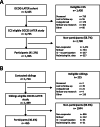Methodology of the DCCSS later fatigue study: a model to investigate chronic fatigue in long-term survivors of childhood cancer
- PMID: 33993873
- PMCID: PMC8127233
- DOI: 10.1186/s12874-021-01298-7
Methodology of the DCCSS later fatigue study: a model to investigate chronic fatigue in long-term survivors of childhood cancer
Abstract
Background: A debilitating late effect for childhood cancer survivors (CCS) is cancer-related fatigue (CRF). Little is known about the prevalence and risk factors of fatigue in this population. Here we describe the methodology of the Dutch Childhood Cancer Survivor Late Effect Study on fatigue (DCCSS LATER fatigue study). The aim of the DCCSS LATER fatigue study is to examine the prevalence of and factors associated with CRF, proposing a model which discerns predisposing, triggering, maintaining and moderating factors. Triggering factors are related to the cancer diagnosis and treatment during childhood and are thought to trigger fatigue symptoms. Maintaining factors are daily life- and psychosocial factors which may perpetuate fatigue once triggered. Moderating factors might influence the way fatigue symptoms express in individuals. Predisposing factors already existed before the diagnosis, such as genetic factors, and are thought to increase the vulnerability to develop fatigue. Methodology of the participant inclusion, data collection and planned analyses of the DCCSS LATER fatigue study are presented.
Results: Data of 1955 CCS and 455 siblings was collected. Analysis of the data is planned and we aim to start reporting the first results in 2022.
Conclusion: The DCCSS LATER fatigue study will provide information on the epidemiology of CRF and investigate the role of a broad range of associated factors in CCS. Insight in associated factors for fatigue in survivors experiencing severe and persistent fatigue may help identify individuals at risk for developing CRF and may aid in the development of interventions.
Keywords: Associated factors; Cancer related fatigue; Childhood Cancer survivors; Chronic fatigue; Methodology; Multivariable fatigue model.
Conflict of interest statement
The authors declare that they have no competing interests.
Figures


References
-
- Sankila R, Martos Jiménez MC, Miljus D, Pritchard-Jones K, Steliarova-Foucher E, Stiller C. Geographical comparison of cancer survival in European children (1988–1997): report from the automated childhood Cancer information system project. Eur J Cancer. 2006;42(13):1972–1980. doi: 10.1016/j.ejca.2006.05.013. - DOI - PubMed
-
- Gatta G, Zigon G, Capocaccia R, Coebergh JW, Desandes E, Kaatsch P, et al. Survival of European children and young adults with cancer diagnosed 1995-2002. Eur J Cancer. 2009;45(6):992–1005. 10.1016/j.ejca.2008.11.042. - PubMed
-
- Geenen MM, Cardous-Ubbink MC, Kremer LCM, van den Bos C, van der Pal HJH, Heinen RC, et al. Medical assessment of adverse health outcomes in long-term survivors of childhood cancer. Jama. 2007;297(24):2705–15. 10.1001/jama.297.24.2705. - PubMed
Publication types
MeSH terms
LinkOut - more resources
Full Text Sources
Other Literature Sources
Medical

